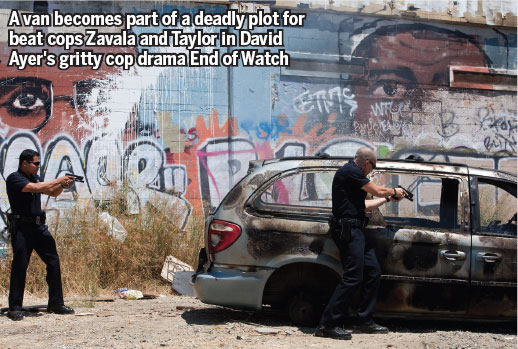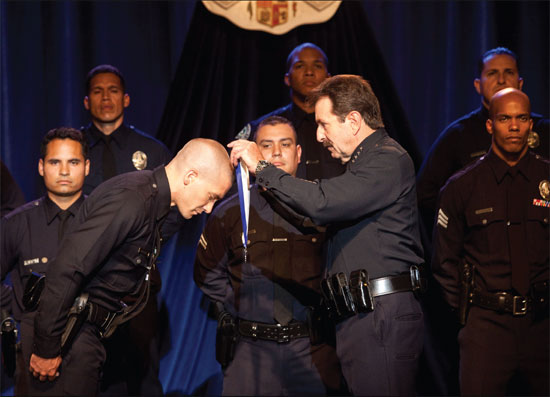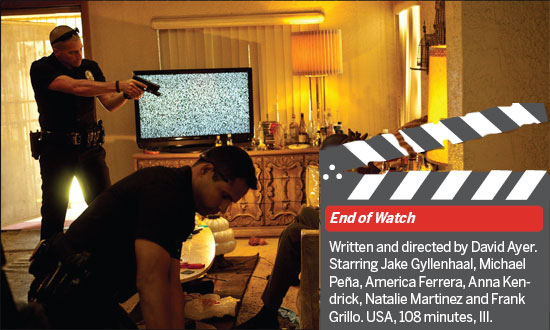Bloody Blue Line
Updated: 2012-10-20 05:47
By Elizabeth Kerr(HK Edition)
|
|||||||
|
Brian Taylor (Jake Gyllenhaal) receives recognition for distinguished, if jaded, service in End of Watch. |

Occasionally gruesome, always compelling cop drama, stands heads and shoulders above its peers. Elizabeth Kerr reports.
David Ayer's End of Watch is the kind of gritty, shaky-cam cop drama that will be adored and loathed in equal measure, probably for the same reasons. Writer-director Ayer has made a living with this kind of material: stuff like Harsh Times, the script for Training Day that netted Denzel Washington an Oscar, and visceral criminal junk like The Fast and the Furious. End of Watch is basically a procedural slice-of-LAPD-life, on the job and off, that follows two long time partners, Brian Taylor (Jake Gyllenhaal) and Michael Zavala (the underrated, underused, outstanding Michael Pea), on their beat through the mean streets of south-central Los Angeles. The neighborhood is nearly mythic in Hollywood-dangerous, depressed, soul crushing-and Ayer does nothing to dispel that image.
Watch is one of the best cop dramas to come down the pipe in several years-or one of the worst depending on your point of view. Ayer could be accused of being lurid in his focus on despair considering Taylor and Zavala's string of gruesome, sensational calls. But the drama is compelling, and there's a refreshing lack of judgment that goes along with it. Angry colleague Van Hauser (David Harbour) has a beef with the department that's never explained. A couple that call in a missing child report-and who've left them in a closet with duct tape over their mouths-are never explained. It could be argued that Orozco (Ugly Betty's America Ferrera) is a clich as a lesbian (Daryl Gates would be proud), but it's never used as a plot point. This version of south central is what it is.
The story is often told through Taylor's digital cameras, attached to his and Zavala's shirt pockets, part of a college elective he's doing on the side. A great deal of the film comes from Taylor's "found" footage, which also adds a frisson to the proceedings that builds nicely to its gut-wrenching conclusion. Ayer, thankfully, knows when to exploit his hand-held images and when to tone it down, but the tension built from them can't be denied. However, the sequences that link the major plot points (chiefly Taylor and Zavala running afoul of a murderous drug cartel), the so-called everyday, are what make End of Watch eminently watchable. An early confrontation with local thug Tre (Cle Sloan) is a foul-mouthed wonder, as is Van Hauser's lecture on exercising caution with the LAPD. The Category III rating is well earned.
But the film lives and dies by the honest, brotherly relationship between Taylor and Zavala. The comfortable back and forth is utterly believable, and the quiet moments between them (after a fire, in a dark alley after a shooting) are genuinely moving. Though Pea steals the movie, Gyllenhaal matches him line for line. It's easy to believe they spend hours every day in a small space, living in each other's pockets and sharing moments every bit as intimate as they do with their wives. When Taylor asked Zavala to "follow him into the burning building," you know Zavala's going to. Rarely does cop life in the movies come across as authentically, and sometimes tragically, as it does in End of Watch.
End of Watch opened in Hong Kong on Thursday.
|
Officers Taylor and Zavala find more misery in south central Los Angeles in End of Watch. |
(HK Edition 10/20/2012 page4)

